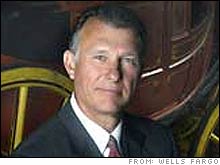|
Mortgage biz fizzles
Wells Fargo's Kovacevich sees the nation's lenders take a 40-50% hit in their mortgage business this year.
NEW YORK (FORTUNE) - Wells Fargo, based in San Francisco, runs a serious business. The fifth largest bank in the United States, it's the only one with a triple-A credit rating. And over 20 years, it's grown its profits an average of 13 percent annually on a compounded basis. Will Wells Fargo's numbers continue to be good? It's tough for most banks right now with a flattening yield curve and dwindling mortgage activity. Wells Fargo (Research) stock has floundered a bit since December and in early January the company suffered an analyst's downgrade.
FORTUNE'S Marcia Vickers spoke with Dick Kovacevich, 62, its innovative and iconoclastic chairman and CEO, about the outlook for house prices and interest rates, Wells Fargo's acquisition plans, and why he once lip-synched to the Beatles. FORTUNE: Obviously the housing market is such a hot topic right now, and you are one of the biggest mortgage players. Will rising rates will put a serious damper on your business? Kovacevich: We've started seeing housing price increases decrease. That is, the amount by which house prices are increasing has started to dwindle. That started six or seven months ago. And it's continuing. Still, I don't think we're yet seeing in many markets a decrease in prices. And interest rates are going up slightly. So the expectation for this year is that take-out mortgages -- where people take out loans based on the increased equity in their house -- and the refinancing part of the mortgage business, which has been about half the business, will likely be much smaller. And yet, as long as people have jobs and the economy still does well and interest rates don't go up too much, purchase mortgages (a classic mortgage taken out to purchase a house) will be very strong because people will have the money to buy homes. But the total industry will probably cut by 40 percent or 50 percent because refinancing and take-out mortgages have accounted for about half of the growth. FORTUNE: Are you worried about that? Kovacevich: Well, I don't really get worried about it. We've been through about five of these cycles. We know it's got to end sometime. When the economy is very good it causes interest rates to rise. That means the rest of our commercial banking business is really taking off. Sure, our mortgage business boomed because interest rates fell so low. But at Wells Fargo our whole business model is based on the belief that we have 84 different financial services businesses, and they're all cyclical at different times. So we hopefully stay healthy through all those cycles. FORTUNE: What's going on with interest rates? Are they going to keep going up? Kovacevich: The Federal Reserve should increase rates by 25 basis points at its next meeting (January 31) and then should pause from making further increases until at least mid-year. Core inflation is under control, productivity is high and the housing market is slowing -- also, the full impact of the previous 13 rate increases hasn't hit the economy yet. FORTUNE: And as you've said, Wells Fargo seems poised to do well in most environments. You've posted the most consistent revenue and profit growth of just about any major bank over the past 20 or so years, right? Kovacevich: Yes, but our business model isn't easy. We really have to work at it. I've got 84 businesses and I've got to make sure that we don't act like 84 businesses relative to our customers. I've got to have technology that accumulates customer data that allows us to cross-sell and have closely integrated businesses. But the bottom line is a customer has to have some advantages by doing more business with us. So I've got to give you a better deal on every product than you're getting somewhere else. And I need to give you one statement of all these relationships and the ability to transfer money back and forth, for instance. So it's a much more complex business model than at most other financial services companies. So the bad news is this is hard to do. The good news is what? This is hard to do. FORTUNE: Despite that, your credo, you've said is to have fun at what you're doing no matter what. I heard you lip-synched to a Beatles song on stage at a Wells Fargo conference a couple of years ago -- that you had a mop-top wig on and the crowd went wild. Kovacevich: I've done a lot of crazy things. I always believed in having fun. Everyone works so hard, and having fun is one of our important values. We try very hard to make sure people at Wells Fargo are happy. We have recognition events at every store once a month. We have regional and national sales winners. But you've got to work hard to have fun. And we do. FORTUNE: Are you looking to make any acquisitions right now? Kovacevich: When you merge and the cultures are very different, it's like starting all over again. And the costs are tremendous. The benefits of mergers are much much lower than the benefits of cross-selling. We're not against mergers, we're just saying that they have to be able to work so that we can still advance our business model.
That said, bank prices are coming down. And we've always liked small banks. So I think we and others will be doing more deals in the next couple of years. |
|

